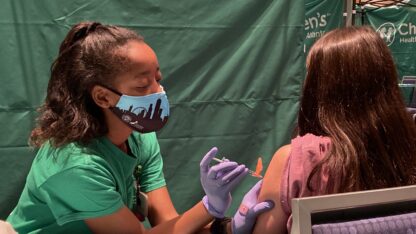Georgia Gov. Brian Kemp sought to shift blame to President Joe Biden for Georgia’s poor vaccination rate Thursday as COVID-19 infections and hospitalizations continued to sprint upward.
The Republican, speaking to reporters, blamed the Democratic president for not doing enough to push the Food and Drug Administration to upgrade its emergency authorization for the vaccines to a permanent authorization. Kemp said urging people to use masks again is a “mixed message” that could discourage vaccination.
The governor reiterated his call for people to get vaccinated against the disease, saying he would only seek other solutions if Georgia hospitals began to get overwhelmed. Georgia ranks in the bottom 10 states for vaccination rates.
“We know that the vaccines work,” Kemp said. “I want to encourage people to get vaccinated if you’re comfortable doing that.”
Democratic State Sen. Michelle Au, an anesthesiologist with a master’s degree in public health, said Kemp’s approach to increasing vaccination rates is unimaginative and passive. She said the state needs to do more to make it easy for people to access vaccines and should push more testing among the unvaccinated.
“We aren’t trying hard enough,” Au said. “We like to blame the unvaccinated.”
Georgia recorded more than 4,800 positive tests for COVID-19 on Thursday, the worst number since Feb. 5. The state peaked on Jan. 8, with nearly 13,000 recorded cases.
The daily case count has more than doubled in a week, as the more infectious delta variant rushes through the state. The number of hospitalized COVID-19 patients rose above 1,800 statewide.
The Georgia Department of Public Health says that fewer than 5,000, or about 0.1%, of the 4.1 million Georgians who have been fully vaccinated had tested positive for COVID-19 through Tuesday. Of those, 118 were hospitalized and 24 died.
Richmond County schools on Thursday joined a list of at least 20 districts keeping or reimposing the mandate, which now extends to a third of Georgia’s 1.7 million public school students.
Dougherty County and Albany returned to requiring people to wear masks inside public buildings, but WALB-TV reported the city would not require people to wear masks at businesses and other privately owned locations. Atlanta on Wednesday made masks mandatory in all indoor public spaces, including private buildings.
The southwest Georgia town of Doerun, meanwhile, closed its city hall lobby until Aug. 9, citing employee exposure to COVID-19.
Infection rates have been highest in southeast Georgia. Charlton County Administrator Hampton Raulerson told The Brunswick News that he believed vaccine rates would climb, but that community interest has been low.
“It’s not lack of availability,” he said. “There’s a lot of distrust when it comes to the vaccine. A lot of people thought (COVID-19) was going away.”
Kemp said he hears many people hesitating because the vaccines are still only approved for emergency use.
“I’d love to see the Biden administration put an operation warp speed on moving away from the emergency use authorization,” the governor said.
The Atlanta-based U.S. Centers for Disease Control and Prevention on Tuesday changed earlier guidelines, recommending that even vaccinated people return to wearing masks indoors in areas with substantial or high transmission. CDC figures show 138 of 159 Georgia counties in those zones. The CDC also recommended that everyone in schools wear masks indoors. Kemp said that shift was eroding trust.
“When you tell them they can get vaccinated and then take their mask off and then you turn around weeks later and reverse that, who’s gonna trust anybody, any politician, Republican, Democrat, or otherwise?” Kemp said.
The governor also said he thought it was counterproductive to ask businesses or local police officers to enforce mask mandates.
“The city of Atlanta can’t keep up with violent crime right now,” Kemp said. “I know these officers damn well don’t have time to be writing tickets for not being masked up. I mean, that is ridiculous, in my opinion.”
Kemp gave no indication, however, that he would try to quash mask rules being issued by cities or school systems, saying, “I trust the local school systems with local control.” The governor allowed a public health state of emergency to expire at the end of June. He had used those emergency powers to try to control local masking orders.








